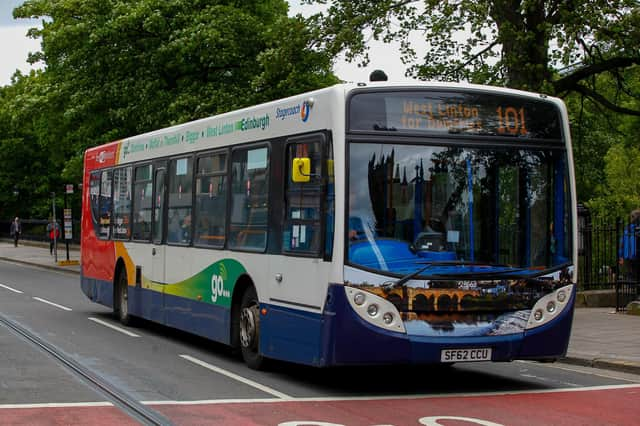Bus giant Stagecoach to help build 'healthier and fairer country' after profits crash amid pandemic


The Perth-headquartered group, which runs some 8,300 buses, coaches and trams, said its “sustainable” public transport services were central to long-term plans for a “greener, smarter, safer, healthier and fairer country”.
Chief executive Martin Griffiths said the industry was facing up to “structural change” amid a more blended working environment for millions of commuters, but added that he was optimistic that bus travel demand will bounce back amid a push to switch away from single car journeys.
Advertisement
Hide AdAdvertisement
Hide AdThe comments came it emerged that half-year statutory profits had plunged 92 per cent to £5.4 million amid a slump in demand for public transport.
Revenues nearly halved to £454.6m in the six months to the end of October, against £800.2m a year earlier. No interim dividend will be paid to shareholders.
The group – founded 40 years ago by Sir Brian Souter, now a non-executive director, and his sister Ann Gloag – said coronavirus lockdowns and ongoing restrictions have left regional bus commercial sales at around 54 per cent of levels seen last year, which it noted was a step back having recovered to almost 60 per cent at one stage.
Britons have switched to travel by car during the crisis, with the firm saying car use was “significantly” ahead of public transport, at up to 90 per cent of levels seen a year earlier in October despite tightening restrictions.
Advertisement
Hide AdAdvertisement
Hide AdBut bosses pointed to a “significant recovery” in passenger demand and commercial revenue since May, even with the impact of physical distancing measures and the second national lockdown in England.
The group also put faith in support from governments “in pursuing our shared objective to drive modal shift from car to public transport”.
Griffiths said: “As well as continuing to provide vital connections to jobs and public services during the current pandemic, our sustainable public transport services are central to long-term plans for a greener, smarter, safer, healthier and fairer country.
“We welcome the UK, Scottish and Welsh governments’ recognition of the importance of bus and tram services, as evidenced by the sector-specific actions they have taken to support the continuation of vital services during the pandemic.
Advertisement
Hide AdAdvertisement
Hide Ad“We are working closely with our government and sector partners on a new framework to ensure the country’s public transport networks adapt to new working and travel patterns, are fit for the post-Covid world, and meet the continuing needs of our customers and communities.”
The firm highlighted its financial muscle, with “substantial” available liquidity in the form of more than £850m of undrawn, committed bank facilities and available cash/deposits.
Half-year results showed regional bus earnings had fallen from £57.1m to £9.1m, helped by government support to keep essential services running through the pandemic.
But the London bus business put in a resilient performance, with earnings rising to £9.2m from £5.1m a year earlier.
Advertisement
Hide AdAdvertisement
Hide AdIn the rail arm, Stagecoach said the Sheffield Supertram business was receiving government payments to provide essential tram services as the group continues to unwind its former train operating companies.
A message from the Editor:
Thank you for reading this article. We’re more reliant on your support than ever as the shift in consumer habits brought about by coronavirus impacts our advertisers. If you haven’t already, please consider supporting our trusted, fact-checked journalism by taking out a digital subscription: www.scotsman.com/subscriptions
Comment Guidelines
National World encourages reader discussion on our stories. User feedback, insights and back-and-forth exchanges add a rich layer of context to reporting. Please review our Community Guidelines before commenting.
